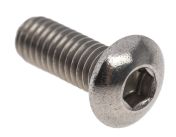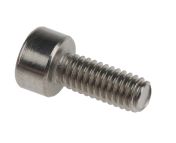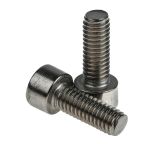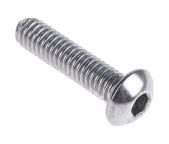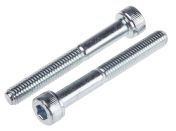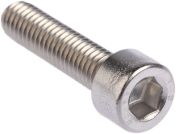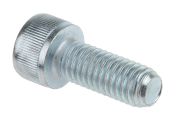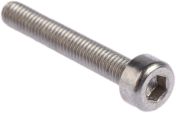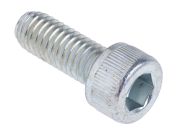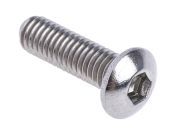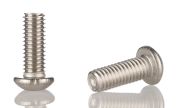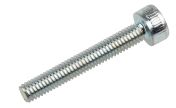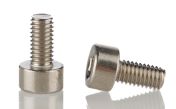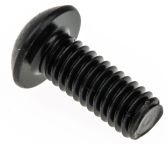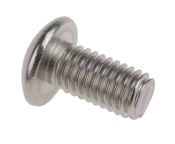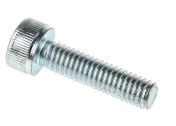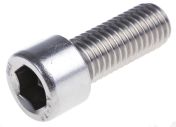Socket Screws
Socket screws have a cylindrical head and an internal hex drive. This unique design makes them ideal for applications where externally wrenched fasteners are not practical due to limited space or accessibility. Socket screws are tightened or loosened using an Allen key or hex key, which is inserted into the internal hex drive to provide torque. As a result, they are sometimes called hexagon socket screws, though they may also be referred to as socket head screw or socket bolt.
Socket head screws are incredibly versatile and are used across a wide range of industries and applications, including machinery, electronics, automotive, and construction. They are known for their high strength, compact design, and ability to withstand high torque.
Discover everything you need to know in our socket screws guide.
Types of Socket Screws
Socket screws come in various head styles to suit different applications and provide specific functionalities. Here are some common types:
Hex Socket Button
Hex socket button head screws have a dome-shaped head with a larger diameter than the screw shank. This larger head diameter distributes clamping force over a wider area, making them more appropriate for holding thin materials such as sheet metal guards or components that could be damaged by excessive pressure.
Hex Socket Cap
Hex socket cap screws have a cylindrical head with a height roughly equal to the shank diameter. They are often used in place of a hex bolt when there is less clearance available or when a lower profile is desired.
Hex Socket Countersunk
Hex socket countersunk screws are designed to sit flush with or below the surface of the material. They feature a conical head with a flat top that matches the angle of a countersunk hole. This creates a smooth, flush surface, which is ideal for applications where a protruding screw head could interfere with other components or create a safety hazard.
Hex Socket Shoulder
Hex socket shoulder screws are often used as a pivot point or axis because shoulders are ground to a tight tolerance. They feature a small cylindrical head with tall vertical sides.
Different Types of Materials for Hex Socket Screws
Socket screws are available in a range of materials to suit every application and environment. They include:
Stainless Steel, including 316 and 304 grades
Stainless steel socket screws are highly corrosion-resistant, making them ideal for use in harsh environments, marine applications, and applications where hygiene is critical.
Grade 316 stainless steel offers superior corrosion resistance, particularly in chloride environments, while grade 304 is a more general-purpose stainless steel suitable for a wide range of applications.
Steel
Steel socket screws offer high strength and are often used in applications requiring high tensile strength and load-bearing capacity.
Steel screws can be further treated with various coatings, such as zinc plating or black oxide, to enhance their corrosion resistance.
Brass
Brass socket screws are known for their corrosion resistance and aesthetic appeal. They are often used in applications where appearance is important, such as in furniture or decorative hardware. Brass is also non-magnetic, making it suitable for certain electrical and electronic applications.
Titanium Alloy
Titanium alloy socket screws offer an exceptional strength-to-weight ratio and excellent corrosion resistance. They are often used in aerospace, medical, and high-performance applications where weight reduction and corrosion resistance are critical. However, titanium alloy screws are generally more expensive than other materials.
Industrial Applications of Hexagon Socket Screws
Hexagon socket screws are essential fasteners in a wide range of industrial applications. Their compact design, high strength, and ability to withstand high torque make them ideal for various industries and demanding environments.
Manufacturing
Socket head screws are widely used in manufacturing for assembling machinery, equipment, and components. They provide secure and reliable fastening in applications where space is limited or high torque is required. Commonly used in the production of automobiles, electronics, appliances, and various other manufactured goods.
Construction
In the construction industry, socket bolts are used for structural steel connections, fastening metal components, and assembling prefabricated structures. Their high strength and ability to withstand heavy loads make them suitable for demanding construction applications.
Electronics
Socket screws are extensively used in electronics for assembling circuit boards, mounting components, and securing enclosures. Their small size and low profile make them ideal for compact electronic devices. Electrical socket screws may be used in specific electronic applications requiring insulation or grounding properties.
Aerospace
Socket head screws are commonly used in the aerospace industry for their high strength-to-weight ratio and reliability. They are used in aircraft assembly, engine components, and other critical applications where safety and performance are paramount.
Medical
Socket screws find applications in medical devices and equipment, where precision and reliability are crucial. They are used in surgical instruments, implants, and other medical devices where secure and precise fastening is essential.
Furniture
Socket screws are often used in furniture assembly for their clean appearance and ease of installation. They provide a hidden fastening solution that enhances the aesthetics of furniture pieces.
How to Select the Right Socket Head Screw or Socket Bolt
Here’s what to consider when choosing an appropriate socket head screw or socket bolt for your application:
- Size and Thread: Determine the required screw size and thread type (metric or UNC) based on your application and the components being fastened.
- Material: Select a material that offers the necessary strength, corrosion resistance, and other properties required for your application. Consider factors such as environmental conditions, load requirements, and desired appearance.
- Head Style: Choose the appropriate head style based on the application and desired aesthetics.
- Length: Determine the required screw length based on the thickness of the materials being joined and the desired thread engagement.
- Drive Size: Ensure the drive size of the socket head screw matches the size of your Allen key or hex key.
- Strength and Grade: Consider the strength and grade of the socket screw based on the load requirements of your application. Higher grade screws offer greater tensile strength.
- Coating: Consider any required coatings, such as zinc plating or black oxide, to enhance corrosion resistance or provide specific properties.
Trusted Socket Screws Manufacturer, Supplier & Distributor in Australia
RS Australia offers a comprehensive range of high-quality socket head screws, hexagon socket screws, electrical socket screws, socket bolts and more for general purpose or specific applications. We stock socket screws in a variety of materials, sizes, and thread types from brands like Holo-Krome, Parker, and our very own RS PRO.
Shop socket screws online today for fast delivery across Australia. For more details on our delivery services and fees, please refer to our Delivery Page.
Popular Searches
Related links
- Everything You Need to Know About Socket Screws
- RS PRO Stainless Steel Hex Socket Cap Screw M10 x 100mm
- RS PRO Plain Stainless Steel Hex Socket Cap Screw M4 x 8mm
- RS PRO Plain Stainless Steel Hex Socket Cap Screw M6 x 20mm
- RS PRO Stainless Steel Hex Socket Cap Screw M12 x 50mm
- RS PRO Plain Stainless Steel Hex Socket Cap Screw M3 x 6mm
- RS PRO Stainless Steel Hex Socket Cap Screw M10 x 30mm
- RS PRO Stainless Steel Hex Socket Cap Screw M6 x 50mm
